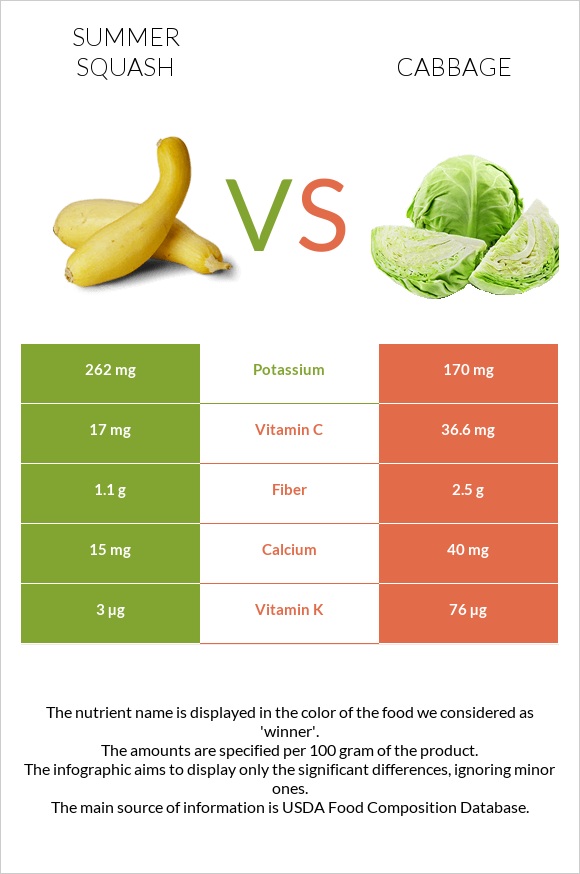Summer squash vs. Cabbage — In-Depth Nutrition Comparison
Compare
Significant differences between summer squash and cabbage
- Summer squash has more vitamin B2 and vitamin B6; however, cabbage is richer in vitamin K, vitamin C, and fiber.
- Cabbage covers your daily vitamin K needs 61% more than summer squash.
- Cabbage has 4 times less vitamin B2 than summer squash. Summer squash has 0.142mg of vitamin B2, while cabbage has 0.04mg.
Specific food types used in this comparison are Squash, summer, all varieties, raw and Cabbage, raw.
Infographic

Infographic link
Mineral Comparison
Mineral comparison score is based on the number of minerals by which one or the other food is richer. The "coverage" charts below show how much of the daily needs can be covered by 300 grams of the food.
| Contains more MagnesiumMagnesium | +41.7% |
| Contains more PotassiumPotassium | +54.1% |
| Contains more CopperCopper | +168.4% |
| Contains more ZincZinc | +61.1% |
| Contains more PhosphorusPhosphorus | +46.2% |
| Contains less SodiumSodium | -88.9% |
| Contains more CalciumCalcium | +166.7% |
| Contains more IronIron | +34.3% |
| Contains more SeleniumSelenium | +50% |
Vitamin Comparison
Vitamin comparison score is based on the number of vitamins by which one or the other food is richer. The "coverage" charts below show how much of the daily needs can be covered by 300 grams of the food.
| Contains more Vitamin AVitamin A | +100% |
| Contains more Vitamin B2Vitamin B2 | +255% |
| Contains more Vitamin B3Vitamin B3 | +108.1% |
| Contains more Vitamin B6Vitamin B6 | +75.8% |
| Contains more Vitamin CVitamin C | +115.3% |
| Contains more Vitamin EVitamin E | +25% |
| Contains more Vitamin B1Vitamin B1 | +27.1% |
| Contains more Vitamin B5Vitamin B5 | +36.8% |
| Contains more Vitamin KVitamin K | +2433.3% |
| Contains more FolateFolate | +48.3% |
All nutrients comparison - raw data values
| Nutrient |  |
 |
DV% diff. |
| Vitamin K | 3µg | 76µg | 61% |
| Vitamin C | 17mg | 36.6mg | 22% |
| Vitamin B2 | 0.142mg | 0.04mg | 8% |
| Vitamin B6 | 0.218mg | 0.124mg | 7% |
| Fiber | 1.1g | 2.5g | 6% |
| Copper | 0.051mg | 0.019mg | 4% |
| Folate | 29µg | 43µg | 4% |
| Calcium | 15mg | 40mg | 3% |
| Potassium | 262mg | 170mg | 3% |
| Iron | 0.35mg | 0.47mg | 2% |
| Phosphorus | 38mg | 26mg | 2% |
| Vitamin B3 | 0.487mg | 0.234mg | 2% |
| Carbs | 3.35g | 5.8g | 1% |
| Magnesium | 17mg | 12mg | 1% |
| Zinc | 0.29mg | 0.18mg | 1% |
| Sodium | 2mg | 18mg | 1% |
| Vitamin A | 10µg | 5µg | 1% |
| Manganese | 0.175mg | 0.16mg | 1% |
| Vitamin B1 | 0.048mg | 0.061mg | 1% |
| Vitamin B5 | 0.155mg | 0.212mg | 1% |
| Choline | 6.7mg | 10.7mg | 1% |
| Fructose | 0.95g | 1.45g | 1% |
| Calories | 16kcal | 25kcal | 0% |
| Protein | 1.21g | 1.28g | 0% |
| Fats | 0.18g | 0.1g | 0% |
| Net carbs | 2.25g | 3.3g | N/A |
| Sugar | 2.2g | 3.2g | N/A |
| Vitamin E | 0.12mg | 0.15mg | 0% |
| Selenium | 0.2µg | 0.3µg | 0% |
| Saturated fat | 0.044g | 0.034g | 0% |
| Monounsaturated fat | 0.016g | 0.017g | 0% |
| Polyunsaturated fat | 0.089g | 0.017g | 0% |
| Tryptophan | 0.011mg | 0.011mg | 0% |
| Threonine | 0.028mg | 0.035mg | 0% |
| Isoleucine | 0.042mg | 0.03mg | 0% |
| Leucine | 0.069mg | 0.041mg | 0% |
| Lysine | 0.065mg | 0.044mg | 0% |
| Methionine | 0.017mg | 0.012mg | 0% |
| Phenylalanine | 0.041mg | 0.032mg | 0% |
| Valine | 0.053mg | 0.042mg | 0% |
| Histidine | 0.025mg | 0.022mg | 0% |
Macronutrient Comparison
Macronutrient breakdown side-by-side comparison
Protein:
1.21 g
Fats:
0.18 g
Carbs:
3.35 g
Water:
94.64 g
Other:
0.62 g
Protein:
1.28 g
Fats:
0.1 g
Carbs:
5.8 g
Water:
92.18 g
Other:
0.64 g
| Contains more FatsFats | +80% |
| Contains more CarbsCarbs | +73.1% |
~equal in
Protein
~1.28g
~equal in
Water
~92.18g
~equal in
Other
~0.64g
Fat Type Comparison
Fat type breakdown side-by-side comparison
Saturated fat:
Sat. Fat
0.044 g
Monounsaturated fat:
Mono. Fat
0.016 g
Polyunsaturated fat:
Poly. Fat
0.089 g
Saturated fat:
Sat. Fat
0.034 g
Monounsaturated fat:
Mono. Fat
0.017 g
Polyunsaturated fat:
Poly. Fat
0.017 g
| Contains more Poly. FatPolyunsaturated fat | +423.5% |
| Contains less Sat. FatSaturated fat | -22.7% |
~equal in
Monounsaturated fat
~0.017g
Carbohydrate type comparison
Carbohydrate type breakdown side-by-side comparison
Starch:
0 g
Sucrose:
0.03 g
Glucose:
0.75 g
Fructose:
0.95 g
Lactose:
0 g
Maltose:
0 g
Galactose:
0 g
Starch:
0 g
Sucrose:
0.08 g
Glucose:
1.67 g
Fructose:
1.45 g
Lactose:
0 g
Maltose:
0.01 g
Galactose:
0 g
| Contains more SucroseSucrose | +166.7% |
| Contains more GlucoseGlucose | +122.7% |
| Contains more FructoseFructose | +52.6% |
| Contains more MaltoseMaltose | +∞% |
~equal in
Starch
~0g
~equal in
Lactose
~0g
~equal in
Galactose
~0g





